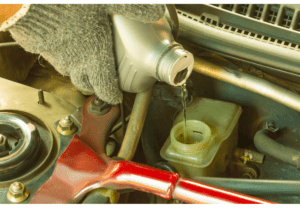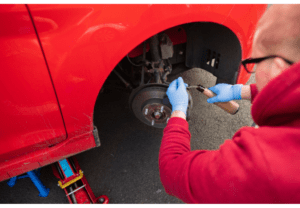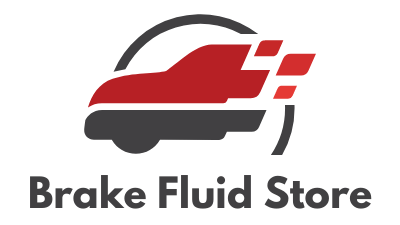The braking system of your vehicle is very complex but in simple terms, it stops your car by using hydraulic pressure and it needs brake fluid to achieve that. However, over time, the brake fluid can lose its effectiveness due to several reasons. You should know how often to change brake fluid in your vehicle to keep your braking system working properly.
If you feel that your vehicle’s braking system isn’t working properly, consider getting it checked because you might need to change its fluid. But how often do you need to change the brake fluid? Let’s discuss everything you need to know regarding this matter.
Contents
What’s the Ideal Change Interval for Your Vehicle’s Brake Fluid?
In general, you don’t need to change your vehicle’s brake fluid too often. However, you must keep an eye on its quality and quantity to make sure that your braking system works as it should.
Many automobile manufacturers offer detailed guidelines and service schedules where you can find information about the change interval of your vehicle’s brake fluid. Typically, the brake fluid of an average car should be changed every two to five years.
You’ll need to go to your mechanic periodically to determine the accurate time when your brake fluid needs to be changed.
What Are the Different Types of Brake Fluid?
Important Elements of Brake Fluid that Every Driver Should Know

Pressing the brake pedal of a car builds up hydraulic pressure in the brake system and increases the pressure on the brake fluid. Resultantly, the brake fluid passes that pressure to the brake pads to slow the rotation of the wheels down and stop your vehicle from causing friction.
It’s a complex system that requires a brake fluid that can work seamlessly under high temperatures and high pressure. It also means that the brake fluid plays one of the most important roles in allowing you to stop your car when needed.
The NHTSA (National Highway Traffic Safety Administration has even set a specific standard for brake fluid. This standard sets the applicable freezing rates, resistance to oxidation, boiling points, moisture content, and more for brake fluid.
The tightly sealed system ensures the longevity and safety of your vehicle’s brake fluid but it deteriorates with the passage of time and needs to be changed.
How Does Brake Fluid Deteriorate Over Time?
Unfortunately, dirt and moisture know how to make their way into even the best sealed and protected places including your vehicle’s braking system. The brake fluid contains some alcohol that helps it absorb moisture and decreases the boiling point of the fluid.
On the other hand, the debris of brake pads, hoses, seals, can lead to contamination in the brake fluid that causes corrosion. Over time, these issues build up and make the brake fluid less and less effective.
If you don’t change your brake fluid on time, you’ll need to change the entire braking system. That’s because the contaminated brake fluid with an extremely low boiling point can severely damage your braking system making it irreparable.
Common Symptoms Indicating That the Brake Fluid Needs to Be Changed
The following are some common symptoms that indicate that you need to change your vehicle’s braking system.
The ABS Light Goes On
Modern cars turn their ABS light on when you need to change your brake fluid. However, it’s important to note that the ABS light can also indicate many other problems related to your vehicle’s braking system including:
Turned off ABS system
Broken wheel speed sensors
Malfunctioning ABS module
If you see that your car’s dashboard has turned on the ABS light, consider getting it checked as soon as possible by taking it to a professional mechanic.
Unusually Soft Brake Pedal
At times, you feel that your brake pedal has become too soft or spongy while applying brakes. It usually happens when the brake fluid has absorbed too much moisture. When you apply brakes the brake fluid is exposed to a very high temperature and if it has too much moisture, it’ll create small air pockets of water vapors.
Not only do these air pockets make your brake pedal soft, but they also reduce the overall effectiveness of your car’s brakes. It can be a significant safety hazard because your vehicle’s brakes won’t work the way you want.
Therefore, if you experience a soft or spongy brake pedal, schedule a brake system inspection right away.
Contaminated Brake Fluid
In a good condition, the brake fluid appears clear, amber, light brown, or golden. If you find that your brake fluid is black or dark, it means that it needs to be changed. The color of the brake fluid darkens because of excessive contamination or aging.
Debris like rust and rubber get clogged up in the brake line and add to brake fluid. In such a situation you’ll need to change your vehicle’s brake fluid to turn it back in perfect condition.
Leaky Brake Fluid
A brake fluid leak rarely occurs but it can significantly reduce the effectiveness of your car’s braking system. You can inspect the master cylinder reservoir to confirm the brake fluid level and in case of a leak, it will be below the “MIN” line.
You’ll need to immediately call a professional mechanic to fix the issue. Make sure that you don’t drive your car to take it to a workshop. Just call the mechanic at your driveway if you find a leaky brake fluid.
Common Symptoms of Low Brake Fluid
There are several signs that indicate that your vehicle’s brake fluid is low. The following are some of the most common ones.
As mentioned earlier, the ABS warning light will turn on if your vehicle’s brake fluid is low. It can also indicate other problems with your brake fluid or the entire braking system.
If your braking system is in a good condition and the quality of your brake fluid is also up to the mark, it means that your vehicle’s brake fluid is low.
If your brake pedal feels abnormally soft or you need to push it down by putting more effort, you might need to add brake fluid.
If you feel a vibration while applying brakes it means that your brake pads are affected. It usually happens because of low brake fluid. You might also hear grinding or squealing noises coming out of your brake pads while applying brakes as well.
If you experience a burning smell right after applying brakes repeatedly, it means your brakes are overheating. It also happens due to low brake fluid.
If you experience any of these symptoms, take your car to a certified mechanic because your brake fluid may be low.
FAQs
Can You Drive with Contaminated or Low Brake Fluid?
Driving with contaminated or low brake fluid can be extremely dangerous. Not only can it lead to a severely damaged braking system but it can also put your and other passengers at risk. That’s why it’s not advisable to drive your vehicle with contaminated or low brake fluid.
If you experience any of the symptoms discussed above, get your vehicle’s braking system and brake fluid checked as soon as possible. In addition, you can also check your brake fluid’s quality as well as quantity at your home by examining the brake fluid reservoir.
If it’s low in quality or quantity, call a professional mechanic at your place to get your brake fluid changed or topped up as soon as possible.
Does Changing Brake Fluid Improve the Braking Efficiency?
Yes, changing your vehicles’ brake fluid will improve its braking efficiency significantly. Your vehicle’s braking fluid gets contaminated over time with metal particles and moisture that decrease the efficiency of your braking system.
Changing the brake fluid on time will make sure that no component of your braking system gets corroded and works efficiently. However, it’s important to make sure that there are no other issues related to your braking system. Otherwise, you won’t experience any change.
Is Changing Brake Fluid a Part of Regular Service?
During a full and interim service at most workshops, your vehicle’s brake fluid is also checked. However, it depends upon the policy of the workshop and you might need to ask the mechanic to inspect your brake fluid. The mechanic will inform you if it needs to be changed or topped up.
Do You Need to Pump Your Vehicle’s Brakes After Changing or Adding Brake Fluid?

In order to remove air from the brake line, you’ll need to pump your vehicle’s brake throughout the process of adding fresh brake fluid. This method keeps the brake pedals from going soft or spongy.
Most mechanics use specially designed pressurized equipment to carry out the pumping process and you don’t need to do it manually. This way, all the air is bled from your vehicle’s braking system so that you won’t feel a soft or spongy braking pedal.
Final Words
Brake fluid is probably the most important part of your braking system and you should change it every two to five years. Otherwise, it’ll go bad by absorbing metal particles, rubber, moisture, and dirt.
Not only will it reduce the performance of your braking system but it can also damage your braking components and put you and other passengers at risk.
